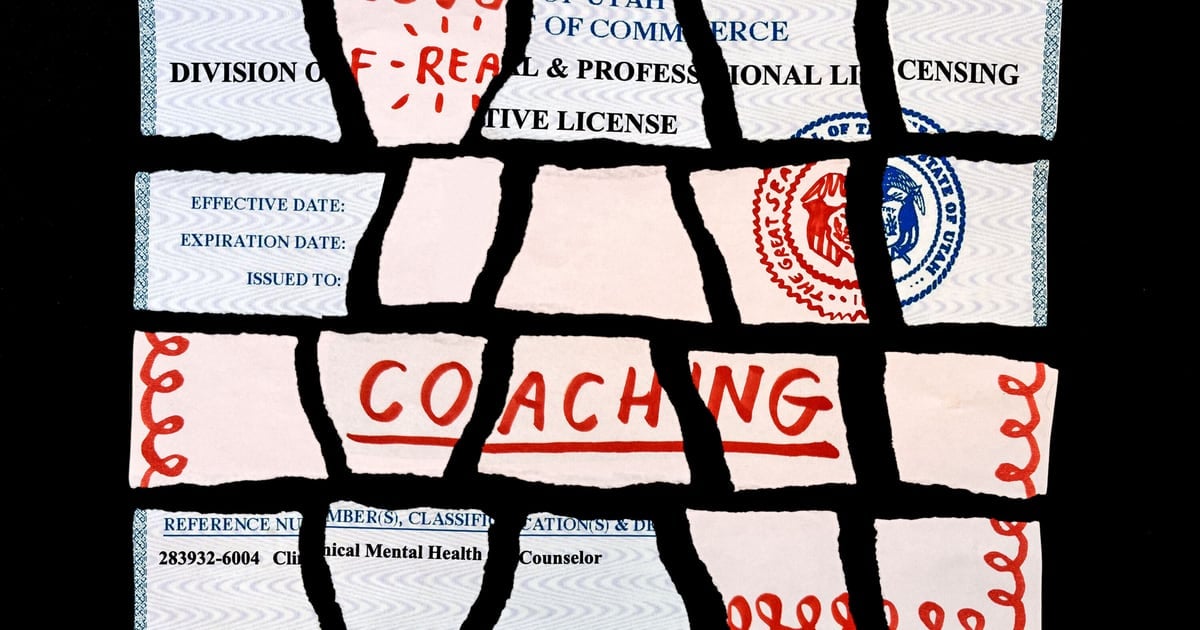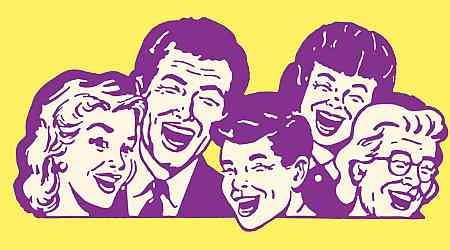This article was produced for ProPublica’s Local Reporting Network in partnership with The Salt Lake Tribune.
A frustrated woman recently called the Utah official in charge of professional licensing, upset that his office couldn’t take action against a life coach she had seen. Mark Steinagel recalls the woman telling him: “I really think that we should be regulating life coaching. Because this person did a lot of damage to me.”
Reports about life coaches — who sell the promise of helping people achieve their personal or professional goals — come into Utah’s Division of Professional Licensing about once a month. But much of the time, Steinagel or his staff have to explain that there’s nothing they can do.
If the woman had been complaining about any of the therapist professions overseen by DOPL, Steinagel’s office might have been able to investigate and potentially order discipline, including fines.
But life coaches aren’t therapists and are mostly unregulated across the United States. They aren’t required to be trained in ethical boundaries the way therapists are, and there’s no universally accepted certification for those who work in the industry.
Simply put, anyone can call themselves a life coach — an industry that is rapidly growing. The International Coaching Federation has estimated that, in 2022, active life coaches generated more than $4.5 billion in revenue worldwide.
But with that growth have come complaints by clients about mistreatment by their life coaches and growing calls for some type of oversight.
In California, a woman sued her life coach in 2020, claiming the coach convinced her to sign over her home to the coach’s nonprofit organization. She settled her lawsuit and got the title to her home back. A Connecticut life coach was given probation after he was charged last year with stealing money from a client with a traumatic brain injury. And this year, a Nevada life coach was sentenced to a year in jail after he admitted to taking money from clients that he was supposed to use for investments on their behalf — but that he spent at casinos instead.
In Utah, there’s a heightened sense of urgency after a therapist-turned-life-coach named Jodi Hildebrandt was sentenced to prison for abusing two of her business partner’s children.
One former client, who was not a part of Hildebrandt’s criminal case, also flagged concerns about how she conducted life coaching with him. Ethan Prete told The Salt Lake Tribune and ProPublica that Hildebrandt had ordered him to cut off contact with friends and family, and at one point asked him to live in a tent in order to “humble” himself. He also said Hildebrandt told him she didn’t want to be limited by the regulations therapists have to follow in Utah.
“She was like, ‘Without all these rules and regulations, now I have free rein to actually change peoples’ lives because the system is corrupt,’” Prete said.
[Tell The Tribune: Help The Tribune investigate Utah’s life coaching industry]
Right now, the only Utah rules that apply kick in when life coaches diagnose clients or develop plans to manage mental health conditions. When that happens, Utah licensers can cite them with what’s known as unauthorized practice. But a records analysis by The Tribune and ProPublica shows citations and fines are seldom used and aren’t always effective — some life coaches have been cited for this multiple times. Prosecutors can also file criminal charges, but a review of court records shows that no such cases have been brought against a life coach in at least a decade.
For more than a year, The Tribune and ProPublica have investigated obstacles that Utahns face when seeking justice against medical providers who they say hurt them — including what happens when they go to state licensers to file complaints. An August investigation by the news organizations showed how patients of a Utah County therapist had reported alleged inappropriate touching to both state licensers and local leaders within The Church of Jesus Christ of Latter-day Saints; neither group reported the therapist to law enforcement. Both said they take allegations of sexual assault seriously and indicated that they had addressed the complaints through their own processes. The Tribune and ProPublica’s reporting led to a police investigation, and that therapist was charged last summer with nearly a dozen felonies. He’s expected to enter a plea in August.
In light of the growth of the life coaching industry, Steinagel said he feels there’s a legitimate question that he plans to work with state legislators to address: “Has life coaching become one of those fields where the potential to harm people who are vulnerable is great enough,” he asks, “that the government should step in and regulate it? I think both the Legislature and we — from what we have seen, especially in the last few years — we think the answer is probably yes.”
Promises to ‘rewire your brain,’ ‘untangle’ your chaos
The scope of what life coaches can offer is undefined and broad: They can promise to help someone lose weight, run their business, change their parenting style, have better sex or improve other aspects of their lives.
Onstage at a recent natural health and wellness conference in Utah, near tables advertising essential oils, drink supplements and chiropractic adjustments, one life coach told assembled audiences she could help women reach their weight loss goals; her yearlong course cost $800.
Next on the program were a couple who, based on their experiences of both twice being divorced, said they could help people “untangle” their emotional “chaos”; another life coach advertised that he could “rewire your brain” to rid yourself of anxiety.
When licensers hear complaints about life coaches, they are most often from the customers themselves, or from a concerned family member or therapist whose patient disclosed past care from a life coach that seemed questionable, said Steinagel, DOPL’s director.
Investigators in his office usually ask dissatisfied clients the same questions: Did they diagnose you? Did they create a treatment plan? Did they treat you for anxiety, depression or another mental health disorder? If the person lodging the complaint answers “no” to these questions, Steinagel said, DOPL can’t do anything.
The public also can’t see any of the specific grievances that have been made against Utah life coaches because of this catch-22: DOPL doesn’t release complaints unless they result in disciplinary action — and DOPL can’t discipline life coaches.
A review of records shows that DOPL has cited 25 people for unauthorized practice in the mental health field in the last decade, a number that included four life coaches and at least one online “influencer” offering “therapy” services.
It appears citations have been successful a handful of times — including with the online influencer, who stopped offering those services on her Patreon account.
But at least two men have been cited for unauthorized practice multiple times and still continue working as life coaches.
One was cited twice by licensers — in 2012, and then again a year later — and now runs a program that trains life coaches. He had previously worked as a therapist, according to public records, but his license had expired. In his second citation, licensers fined him $1,000 after they said he advertised himself as a “psychotherapist” in a marketing brochure for a seven-day retreat.
Another man, Denim Slade, was cited and fined $250 just three months after he surrendered his therapy license after DOPL received two reports that he engaged in inappropriate conduct with female clients. DOPL cited him, according to public records, for advertising that he did “Lifespan Integration Therapy” and could treat trauma in his life coaching business. A year later, he was cited again for unauthorized practice after DOPL received reports that he continued to advertise that he treated mental health issues like depression, anxiety, trauma and post-traumatic stress disorder. The life coach told a DOPL investigator he didn’t realize those posts were still active after he gave up his license and agreed to remove them.
Slade told The Tribune and ProPublica that he has never conducted therapy or mental health treatment as a life coach. He admitted that, in his therapy practice, he had allowed “some mild boundaries to be crossed” with one client. But he also said the DOPL records did not contain “the full picture” and that he felt pressured to admit to doing something wrong after licensers received a second report years later; he denied that allegation, but rather than fighting it, he decided to relinquish his license and turned to life coaching.
“I was excited at the prospect of working with an appropriate coaching population and transitioning to helping people who were already doing fairly well in their lives and wanting, but not necessarily knowing, how to excel,” Slade said. And he said while he feels there can be “some overlap” between life coaching and therapy, he believes “these are two definably different populations with different needs. I do not think life coaches should be conducting therapy.”
He also said he believes there are already safeguards in place for people doing mental health work that requires a license, and it’s already against the law to practice therapy without a license.
“I think people ought to be able to hire someone to help them with things in their lives that they want extra help with,” he said. “Do you regulate someone wanting to get help organizing their house, teaching art to kids, teaching piano, coaching Little League sports? I don’t know where that line should be.”
Therapist organizations in Utah have been a driving force in advocating for some measure of state oversight of life coaches. “Regulation really keeps them in their lane, us in our lane, and just increases consumer safety all around,” said Sarah Stroup, a licensed therapist who is on the legislative committee for the Utah Association for Marriage and Family Therapy.
Jessica Black, a licensed therapist who works with the Legislature in her role with the Utah Mental Health Counselors Association, said she sees particular vulnerabilities when life coaches try to help someone struggling with their mental health.
“There’s a difference between a business coach coaching you on how to build a business,” Black said. “But when you’re dealing with somebody’s mental health, or when you’re dealing with their life — that’s how people get taken advantage of.”
When therapists become life coaches
There have been Utah therapists who have lost their licenses for misconduct who, despite being deemed unsafe to work with patients, have still been able to continue their careers working in the mental health field — often in the unregulated realm of life coaching.
At least 43 Utah mental health professionals have surrendered their licenses or had them revoked, denied or expired on suspension since 2010, according to a review of publicly available DOPL disciplinary records. Of those, it appears that a third have continued working in mental health, according to searches of LinkedIn profiles and business websites — as mental health “associates,” motivational speakers and life coaches.
Some of those who have continued to work with clients on their mental health or well-being had lost their therapy licenses for serious reasons, DOPL records show. Several struggled with drug or alcohol use. Others lost their licenses after being accused of having inappropriate contact with patients, including Slade, who admitted in 2013 he had an inappropriate relationship with a married client. He gave up his license in 2019 after another patient reported to DOPL that he had engaged in “inappropriate physical and verbal conduct” with her; he denied this accusation in licensing records. A second therapist was charged with sexual exploitation by a medical care professional in Idaho, and a third touched a teenage girl’s leg and torso during a therapy session in an effort to “sexually stimulate” her as part of a therapeutic technique. (This man subsequently got his license back and was again accused of unprofessional conduct; he has now agreed to stop practicing entirely — including as a life coach — while DOPL and the police investigate.)
Steinagel said it’s “very frustrating” when therapists who lose their licenses continue doing mental health work as life coaches. He also said that while licensers can’t prohibit them from working in the unregulated field of life coaching, investigators often keep a close eye on such coaches to ensure they don’t cross into therapy.

In Hildebrandt’s case, it appears she deliberately decided to leave the regulated field of therapy. Over a decade ago, in 2012, promotional materials for her self-help company leaned into her credentials as a licensed therapist and experience as an addiction counselor.
But after more than a decade of running ConneXions Classroom, Hildebrandt had changed her website: References to her credentials as a therapist were gone, and she instead began calling herself a life coach. (At the time, she was still licensed as a clinical mental health worker and could have used that designation.)
“I began practicing in the psychotherapy world, and my patients were not healing,” she wrote on her website in 2022. “When I began empowering people by educating them with principles of Truth (learning to be honest, responsible, and humble), I saw my patients radically change right in front of me!”
Prete, the former client, met Hildebrandt as he was struggling in his marriage during the pandemic and after the birth of their first child. His now-ex-wife wanted to try the ConneXions program, he said.
The help he was seeking came with a cost: To start, he had to pay a monthly charge to participate in a group video call every Saturday morning. He paid another weekly fee to be part of a men’s small group. On top of that, he paid weekly to meet one-on-one with Hildebrandt. In total, he was spending more than $1,000 a month.
“I would meet with her every week for almost a year,” he said of Hildebrandt. “And it was always like, your wife is going to leave you. If you ever want to see her again, you’ll do what I say.”
After Hildebrandt told him to cut off contact with friends and relatives, he said, he was living separately from his family and Hildebrandt told him and his wife not to speak to each other. Hildebrandt, he said, “had complete control.”
Hildebrandt is currently in prison, and DOPL revoked her license as a clinical mental health worker in May in response to her child abuse convictions. Her attorney did not respond to a list of questions sent to him for this article.
A moment for Utah
In the final days of Utah’s 2024 legislative session, Kevin Franke, the father of the children abused by Hildebrandt, made a plea to lawmakers in a letter, asking them to pass a bill that would require life coach registration.
He wrote about the impact of being a client of Hildebrandt’s with his now-ex-wife, how his marriage ended and how his children were deeply harmed. All of it, he wrote, had been at the directive “of a dangerous mental health professional who believes that she could act outside the ethical balance of her profession by labeling herself as a life coach.”
Franke also asserted that Utah’s culture makes its citizens particularly vulnerable. The state’s attorney general has acknowledged that Utah has held a decades-long reputation for being the “fraud capital of the United States.” That’s in large part because of a local culture of trust in institutions among members of the dominant religion, The Church of Jesus Christ of Latter-day Saints. Investment fraud targeting LDS church members, Ponzi schemes and scams carried out in a style that mimics Utah’s significant multi-level marketing industry are prevalent in the state. Black, the therapist with the Utah Mental Health Counselors Association, said that’s why Utah legislators should lead in regulating life coaches.
“I think it is a national problem. I think Utah’s unique in the sense that they’re very easily bought into MLMs,” she said about multi-level marketing. “That’s kind of the structure of a lot of these life coaches. The more you pay, the more access you get. The more perks you get.”Legislators in a handful of other states have tried to enact some oversight, but so far no proposals have become law.
New Hampshire legislators debated a bill in 2019 that would have studied whether life coaches should be regulated. The bill didn’t pass.
Two years later, in Oregon, legislators considered establishing a voluntary registry for those who provide “alternative therapy,” like life coaches. It also would have allowed the state to impose discipline for certain violations. But the measure failed after several life coaches pushed back.
“Coaching is not, nor claims to be, a form of therapy,” one Oregon coach wrote. “Coaching is partnering with clients in a thought-provoking and creative process that inspires them to maximize their personal and professional potential.”
Life coaches are not required to be certified by the International Coaching Federation or any other organization. There’s no Utah ICF chapter, and the ICF did not respond to interview requests.
The ICF did release a statement to The New York Times, which recently reported the experiences of several people who felt they had been tricked into paying for courses to become life coaches as part of a “pyramid scheme.”
Carrie Abner, the vice president of credentials and standards at the ICF, told the newspaper that coaching is a “self-regulated industry,” and clients should make sure they are working with coaches that are trained, are experienced and have credentials. Credentialed ICF members, she added, agree to abide by an ethics code.
In Utah, state Sen. David Hinkins’ bill to require life coaches to register with DOPL never got past a first hearing. State lawmakers, however, are expected to continue the discussion this month during legislative committee meetings.
Franke said in his letter that he was able to get a measure of accountability because Hildebrandt and his ex-wife — who also participated in abusing the children — broke the law and went to prison. But not every ethical violation is a crime. And people who have been taken advantage of emotionally or financially, he said, have little recourse.
“These individuals are literally ghosts,” he wrote, “and are free to sell their supposed life expertise to anyone willing to purchase it.”
Mollie Simon contributed research, and Jeff Kao contributed data reporting.























